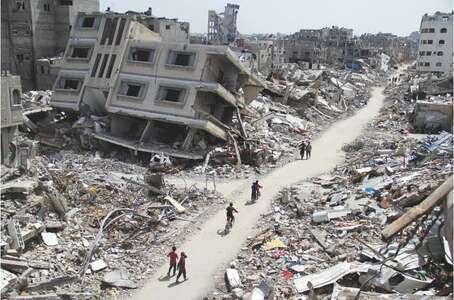GAZA STRIP: Israel announced on Friday that it would allow “temporary” aid deliveries into famine-threatened northern Gaza, hours after the United States warned of a sharp shift in its policy over Israel’s war against Hamas.
Germany on Friday said Israel had “no more excuses” to delay the entry of aid, after nearly six months of war.
The health ministry in Hamas-run Gaza reported at least 54 more people killed in Israeli strikes over the previous day.
In a tense, 30-minute phone call on Thursday, US President Joe Biden told Prime Minister Benjamin Netanyahu that United States policy on Israel was dependent on the protection of civilians and aid workers in Gaza, the first hint of possible conditions to Washington’s military support.
Move comes after US warned of sharp policy shift over deaths of civilians, aid workers
Just hours later, overnight in Jerusalem, Israel announced it would open more aid routes into the coastal Palestinian territory which Israel placed under siege at the start of the war nearly six months ago.
“Israel will allow the temporary delivery of humanitarian aid” through the Ashdod Port and the Erez land crossing, as well as increased deliveries from neighbouring Jordan at the Kerem Shalom crossing, Netanyahu’s office said.
Israel’s military campaign in Gaza has killed at least 33,091 people, according to the health ministry in Gaza, while the United Nations has warned of “catastrophic” hunger.
‘Unacceptable’
Palestinians in northern Gaza have eaten an average of just 245 calories per day — less than a can of beans — since January, according to the charity Oxfam.
Charities have accused Israel of blocking aid, but Israel had defended its efforts and blamed shortages on groups’ inability to distribute aid once it gets in.
The dangerous work of trying to stem a famine was underscored this week by an Israeli strike that killed seven humanitarian workers — an Australian, Britons, a North American, a Palestinian and a Pole.
Australian Foreign Minister Penny Wong told Britain’s The Guardian newspaper, in comments published on Friday, that Netanyahu’s initial comment on the deaths was “deeply insensitive”.
The Israeli leader had said: “It happens in war.” He said the killings were unintentional and pledged an investigation “right to the end”.
Wong said Australia does “not accept any suggestion that this is just something that can be brushed aside as just something that happens in war”.
In his call with Netanyahu, Biden “made clear that US policy with respect to Gaza will be determined by our assessment of Israel’s immediate action” to improve the humanitarian situation, according to a White House summary.
Allies have been pressing Biden to leverage the billions of dollars in military aid sent by Washington.
German Foreign Minister Annalena Baerbock, writing on social media platform X, said the people of Gaza “need every aid package now… We expect the Israeli government to implement its announcements quickly”.
US top diplomat Antony Blinken told reporters after the leaders’ phone call that “if we don’t see the changes that we need to see, there’ll be changes in our own policy”. He did not elaborate.
Pentagon chief Lloyd Austin said the deadly strike on the World Central Kitchen staff had “reinforced the expressed concern over a potential Israeli military operation in Rafah”, Gaza’s southern city.
‘No rules’
Relentless Israeli bombardment has reduced much of Gaza to rubble, collapsed the hospital system and spawned a humanitarian crisis, with all of the 2.4 million Palestinians “experiencing acute food insecurity and malnutrition,” a World Bank report said on Tuesday.
Despite the dire need, relief work has become almost impossible in Gaza, major international aid groups, including Oxfam and Save the Children, said after Israel killed the World Central Kitchen staff.
Spanish NGO Open Arms, which along with World Central Kitchen was working to establish a maritime aid corridor, announced it was suspending operations after the strike.
Published in Dawn, April 6th, 2024















































Dear visitor, the comments section is undergoing an overhaul and will return soon.